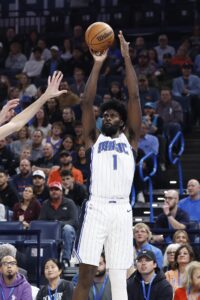In a pair of previous articles, we took a closer look at the trade restrictions placed on two groups of players who signed free agent contracts this past offseason. The smaller of the two groups featured players who can’t be traded by their current teams until January 15, having re-signed on contracts that met a set of specific criteria. The other offseason signees we examined aren’t eligible to be traded until December 15.
In addition to those two groups, there are a few other subsets of players who face certain trade restrictions this season. They either can’t be traded until a certain date, can’t be traded in certain packages, or can’t be traded at all prior to February’s deadline.
Listed below are the players affected by these trade restrictions. This list, which we’ll continue to update throughout the season as needed, can be found on our desktop sidebar under “Hoops Rumors Features,” or in our mobile menu under “Features.”
Players who recently signed as free agents or had their two-way contracts converted:
A player who signs a free agent contract typically becomes trade-eligible either three months after he signs or on December 15, whichever comes later. That means a player who signs on September 1 would become trade-eligible on Dec. 15, but one who signs on Sept. 22 wouldn’t be eligible to be dealt until Dec. 22.
Similarly, players who have two-way pacts converted to standard contracts can’t be dealt for three months after that happens.
Here are the affected players, who signed free agent contracts or were converted from two-way deals after Sept. 15, along with the dates their trade restrictions lift:
December 17:
 Isaac Okoro (Cavaliers)
Isaac Okoro (Cavaliers)
January 2:
- DaQuan Jeffries (Hornets)
January 15:
- Scotty Pippen Jr. (Grizzlies)
January 16:
- Doug McDermott (Kings)
January 28:
- Jay Huff (Grizzlies)
February 5:
- Ariel Hukporti (Knicks)
Players who sign free agent contracts or have their two-way deals converted to standard contracts after November 6 this season won’t become trade-eligible prior to the 2025 trade deadline, which falls on February 6. That restriction applies to the following players, listed in alphabetical order:
- Jae Crowder (Kings)
- Keshad Johnson (Heat)
- Paul Reed (Pistons)
- Landry Shamet (Knicks)
Players who recently signed veteran contract extensions:
A player who signs a veteran contract extension can’t be dealt for six months if his new deal exceeds the NBA’s extend-and-trade limits by meeting any of the following criteria:
- Includes a first-year raise greater than 20% (or greater than 20% of the estimated average salary, for players earning below the average).
- Includes a subsequent annual raise greater than 5%.
- Includes a renegotiation of the player’s current salary.
- Secures the player for more than four total seasons (including both his current deal and the extension).
A player can sign a veteran extension and remain trade-eligible as long as his new deal doesn’t meet any of those criteria. Timberwolves big man Rudy Gobert, for instance, remained eligible to be traded after signing a three-year extension that featured a pay cut in the first year and raises below 5% in the second and third years.
Here are the players whose recent veteran extensions exceed the extend-and-trade limits, along with the dates their trade restrictions lift:
January 6:
- Bam Adebayo (Heat)
 Jonathan Isaac (Magic)
Jonathan Isaac (Magic)- Derrick White (Celtics)
January 7:
- Donovan Mitchell (Cavaliers)
January 12:
- Jalen Brunson (Knicks)
January 23:
- Sam Hauser (Celtics)
January 26:
- Andrew Nembhard (Pacers)
February 2:
- Jarrett Allen (Cavaliers)
Ineligible to be traded before this season’s February 6 deadline:
- Wendell Carter Jr. (Magic)
- Alex Caruso (Thunder)
- Joel Embiid (Sixers)
- Aaron Gordon (Nuggets)
- Lauri Markkanen (Jazz)
- T.J. McConnell (Pacers)
- Jamal Murray (Nuggets)
- Ivica Zubac (Clippers)
Additionally, when a player signs a super-max contract extension, he becomes ineligible to be traded for one full year.
That means Celtics forward Jayson Tatum won’t become trade-eligible prior to the 2025 deadline despite signing his extension in July. Tatum is the only player who signed a super-max (designated veteran) contract this summer.
Players who were recently claimed off waivers:
A player who is claimed off waivers is ineligible to be traded for 30 days. When a waiver claim occurs during the offseason, the 30-day clock begins on the first day of the subsequent season.
As our tracker shows, four waiver claims occurred during the 2024 offseason, but only one of those players is on a standard contract: Pistons big man Paul Reed.
Reed will remain ineligible to be dealt for the first 30 days of the season, then become trade-eligible on November 21.
Players who were recently traded:
Players who were recently traded can be flipped again immediately. However, unless they were acquired via cap room, they can’t be traded again immediately in a deal that aggregates their salary with another player’s for matching purposes.
For instance, after acquiring Jalen McDaniels from the Kings on October 15, the Spurs could have turned around and traded McDaniels and his $4.74MM salary right away for another player earning about the same amount. But if San Antonio had wanted to package McDaniels and, say, Zach Collins ($16.7MM) for salary-matching purposes in a deal for a bigger-money player, the team would have had to wait two months to do so.
There are two trades that currently fall within the aggregation restriction window: San Antonio’s acquisition of McDaniels and the three-team Karl-Anthony Towns blockbuster that was completed on October 2. However, the aggregation restriction doesn’t apply to most of the players involved in those deals for the following reasons:
- McDaniels (Spurs), Keita Bates-Diop (Timberwolves), Duane Washington (Hornets), and Charlie Brown Jr. (Hornets) have all been waived since being traded.
- The Timberwolves aren’t permitted to aggregate salaries since they’re operating over the second tax apron, meaning Julius Randle and Donte DiVincenzo are ineligible to be aggregated whether or not that two-month window has expired.
- DaQuan Jeffries was signed-and-traded to the Hornets as part of the Towns deal. Since he signed a new contract, the trade restrictions for recently signed free agents apply to Jeffries and he’s ineligible to be moved at all for three months.
That leaves just one player to whom the aggregation restriction applies: Towns can be aggregated with another player’s salary by the Knicks as of December 2.
Any player who is traded after December 16 (without being acquired via cap room) won’t be eligible to be flipped before the trade deadline in a second deal that aggregates his salary with another player’s. A special exception allows a player acquired between Dec. 6 and Dec. 16 to be “re-aggregated” on Feb. 5, a little ahead of the typical two-month waiting period.
Note: Only players on standard, full-season contracts are listed on this page. Players who sign 10-day contracts can’t be traded. Players who sign two-way deals can’t be traded for up to 30 days after signing.